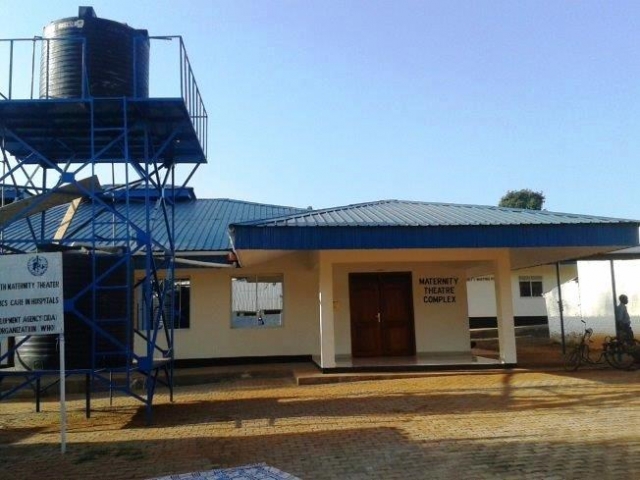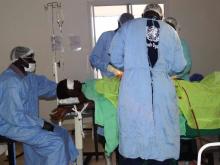WHO in South Sudan: Build, Equip and Deploy to Save the Lives of Mothers
 With 789 deaths per 100 000 live births, South Sudan is among 40 countries with the highest maternal mortality (death) rates in the world. It may be important to note that while South Sudan is among the 18 countries with very high mortality, the country has made some progress between 1990 and 2015 as the maternal mortality rate decreased by 54.4% from 1730 deaths per 100 000 live births in 1990 to 789 in 2015. Still, a woman has a 1 in 6 chance of dying in childbirth; and only 0.6% of all expectant mothers have access to comprehensive emergency obstetrics and neonatal services. The regional average of access to these services is 12% and the expected coverage is 100%.
With 789 deaths per 100 000 live births, South Sudan is among 40 countries with the highest maternal mortality (death) rates in the world. It may be important to note that while South Sudan is among the 18 countries with very high mortality, the country has made some progress between 1990 and 2015 as the maternal mortality rate decreased by 54.4% from 1730 deaths per 100 000 live births in 1990 to 789 in 2015. Still, a woman has a 1 in 6 chance of dying in childbirth; and only 0.6% of all expectant mothers have access to comprehensive emergency obstetrics and neonatal services. The regional average of access to these services is 12% and the expected coverage is 100%.
With support from the Government of Canada, the World Health Organization (WHO) has been implementing a comprehensive emergency obstetric and neonatal care project (CEmONC) in the country since 2011 to improve access, availability and quality of CEmONC and other health services. Through the project, WHO constructed three maternity complexes in Bor Yambio, and Wau with delivery rooms, operating theatres and waiting homes for expectant mothers.
The availability of a skilled birth attendant is one of the most critical factors that impact on maternal and newborn survival. However, as a result of the on-going crisis in the country, South Sudan has extremely low health worker to population ratio. It is recommended that countries aim for a minimum of 4.5 health workers: 1000 population in order to attain the Health related SDGs (Global Health workforce 2030). WHO therefore recruited and deployed highly qualified doctors, especially obstetricians, and midwives to serve in the three maternity complexes and lead outreach and awareness programs that will be key links between the facilities and the communities they serve.
Through the same support, WHO has also deployed obstetricians and midwives in six former states (Jonglei, Western Equatoria, Western Bahr el Ghazal, Northern Bahr el Ghazal, Warrap and Eastern Equatoria) to provide emergency and life-saving interventions, build the capacity of mid-level health workers on basic life-saving services, equipping them to be instrumental in linking services to the community through regular monthly outreach and awareness programs.
As part of the on-going second phase of the project that comprises strengthening infrastructure, equipment and training of health personnel for reduction of maternal mortality in South Sudan, WHO is building additional maternity complexes in Torit, Kuajok and Awiel. Both phases are funded by the Government of Canada through its Department of Foreign Affairs, Trade and Development (DFATD).
“I am alive today because this service is available” – one woman’s story
Newly pregnant Colleata Abdok came to Wau Teaching Hospital complaining of severe abdominal pain and dizziness. She had sought help from a private practitioner but was not happy with the services and care she received. ‘’I was shouted at by the doctor when I entered his office and did not have opportunity to present my case clearly because I was intimidated,” she recalls with a shudder. Colleata then sought help from other facilities where she was treated for malaria and typhoid fever but her situation worsened.
One day, whilst at home going about her daily household chores, the pain became unbearable and she was rushed to the newly built Wau Teaching Hospital. A diagnostic ultrasonography revealed a ruptured ectopic pregnancy with haemorrhage and severe anaemia. Immediate preoperative care was carried out and an emergency life-saving surgery was done by the WHO project team: a technical officer, assisted by the unit medical officer.
Colleata fully recovered from the surgery and was discharged on the third day. She returned home with her hope restored and with a renewed determination to live happily with her family. She also promised to spread the word among her community that women should seek professional care in a government facility where WHO has deployed highly skilled professionals.
Colleata Abdok’s story is just one of the many happy endings and evidence that demonstrate the effectiveness and efficiency of this health systems strengthening and capacity building initiative, and the immeasurable benefit it is bringing to the people of South Sudan through saving the lives of mothers and their newborns.



